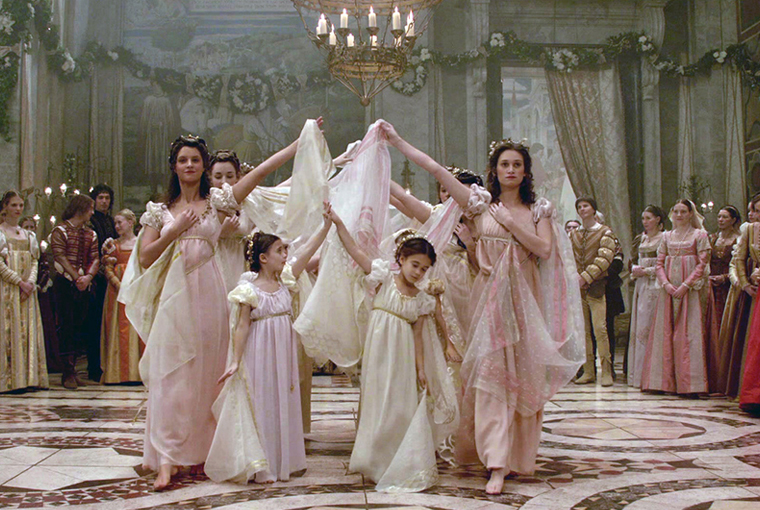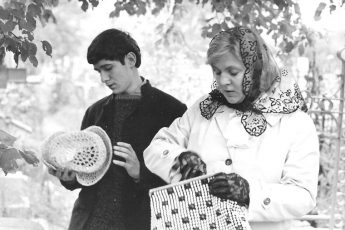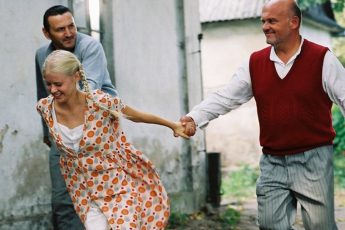Revolutionary Claims
Alexander Sokurov’s Russian Ark (Russkiy kovcheg, 2002)
Vol. 8 (August 2011) by Stefania Marghitu
Revolutionary is a description often used in technology and breakthrough achievements, and can easily be used in a field such as marketing or promotion. But when a Russian director such as Alexander Sokurov is told his film is revolutionary, he is not so quick to accept the compliment. In many Romanian films, the survivors of the 1989 revolution even question its validity. A coup? Maybe. A shift? Yes. A Revolution? Hardly.
Russian Ark is undeniably revolutionary in terms of film innovation. Long takes that last merely a few minutes are discussed in Film Studies for their careful execution, so one can only imagine the significance of a 90-minute feat. But Sokoruv will not consider his film revolutionary because he is only attempting to continue his work within the tradition of fine arts, regarding the medium as a two-dimensional surface. His point of reference is painting, and in an interview he proclaimed that “strictly speaking, the surface of the screen and that of the canvas are one and the same.” (Artforum International Magazine 2001 / Interview by Lauren Sedofsky).
Just as some of the greatest works of art in history appear to have been produced by a single brush stroke, Russian Ark was filmed in a single breath. The result is a dreamlike fluidity that never comes off as sloppy. What errors one might observe, such as the uneasy glance of a lurking or confused extra, can surely be pardoned. Sokurov also said that the canons of painting have already established the vocabulary, conditions and expectations of a film image. He might be under the belief that all worthy films should not be art films, but film as art. Whereas some film purists are more inclined to demand Cinema as its own art form or equal to literature and theatre, Sokurov sees the field as still underdeveloped.
When considering the picture plane and blank canvas, Sokurov has created a film in which the mis-en-scène is not just the sum of his efforts, but the principal character. The Hermitage holds the paintings he emulates, the history he summarizes, and the confinement of space he is able to challenge. The narrative is rooted in the navigation.
Theorists can argue that the first film was created when individuals first dreamt of displaying a narrative of images, rather than by its first material embodiment. And seemingly avant-garde or denunciatory artists are less likely to claim an entirely new concept, but instead take their cues from understated or overlooked points in history. The Surrealists denounced bourgeoisie art while excluding a few precursors such as De Chirico. The Nouvelle Vague never shunned Hollywood Cinema as a whole, declaring the notable influence of the likes of Hitchcock and Hawkes. And Film Noir as a genre and style was given its name by French critics.
I first witnessed Russian Ark when I was a dissatisfied Art History major engulfed in a Soviet Cinema course. Sokurov’s ambition and mastery represented more of a continuity of Fine Art than a vast majority of the modern art I was exhaustively analyzing at the time. What marveled me about Film Studies was its openness to other forms and disciplines. One can read on sociology, history, popular culture and so on all for the benefit of understanding Cinema. But Sokurov does not bother himself with questions of politics and postmodernism. One can discuss the tensions between Western Europe and Russia as embodied in the French aristocrat and Russian narrative that guides us through the Winter Palace.
One can also easily romanticize the golden era of art, literature and theatre. The beauty of film, which is still a teenager in relation to its predecessors and peers, is the freedom to experiment and to take what one chooses from history as well as new technology. Sokurov could have not made his traditionalist homage without the use of digital technology and a new Russian society. And perhaps he does not take such a huge credit because he knows someone long before him dreamed of it, and he was simply the one able to execute it.




Leave a Comment